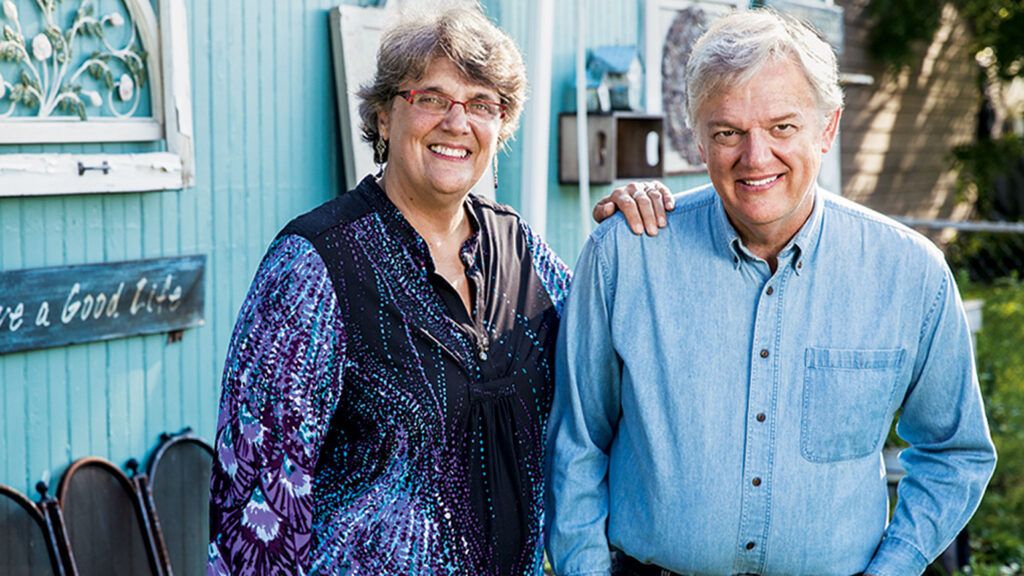A decade ago, Alzheimer’s disease wasn’t on my radar. My husband, Bob, and I were in our fifties, immersed in our careers. He was a local radio and television personality, and together we had built an Emmy Award–winning video production company. Our two boys were working, with our youngest just a year shy of college graduation.
In 2012, Bob received a shocking diagnosis: probable Alzheimer’s. He was 58. There was no family history of dementia; he’d never had a head injury. I couldn’t fathom how this could happen or how our lives would change.
Nine years later, I can emphatically say that Alzheimer’s has brought us challenges and joys. It drew us closer. Even when a spouse has dementia, you can still have a productive and loving life together. Here are the five most important lessons I’ve learned as a long-term caregiver.
Ask for Help
Alzheimer’s often causes the person who has it, as well as those who take care of them, to shrink from sight. Friends sometimes pull away too. It can be awkward communicating with someone who has dementia. There’s a loss of shared events or mutual responsibilities, even a fear of facing one’s own mortality.
Because Bob was in the public eye, I knew he would likely lose his jobs if word got out. To give me time to plan, I told almost no one.
We’d just moved into a new home when Bob was diagnosed. My coworkers and friends would ask: “How’s the new neighborhood?” “Find any new restaurants?” “Got all those boxes unpacked?” I wanted to shout, “Our lives are falling apart, and I don’t know what to do!”
As Bob’s condition worsened, I finally confided in more people. What a relief! I got better at asking for help. I used social media to find people to show me how to fix blocked drains and reglaze windows. Our church’s women’s group brought us meals. I launched a Facebook page to keep old friends and colleagues informed, which elicited offers to take Bob out. (One friend even took him to the Indy 500!)
Two of Bob’s coworkers began an annual tradition of helping me wrap my Christmas gifts. As Bob’s Alzheimer’s progressed, I brought in a volunteer to provide respite care and eventually day centers and paid caregivers. Each stage of dementia requires new knowledge and help, so even if you start alone, build your team around you. That’s how you survive well. You can’t do this alone.
Welcome Something Good into Your Life
A terminal disease crowds out everything else. Dreams dissolve. Unknowns loom large. New demands on your time and wallet make leisure activities seem impossible.
Other than for work and necessities, I barely left the house during the first nine months after Bob’s diagnosis. Finally we went to our first support group meeting of families afflicted with early-onset Alzheimer’s. Month after month we met, sharing invaluable life lessons. Then a novel idea emerged. What if we got together as a group without Alzheimer’s as our focus? What if we all just went out and had some fun?
I’ll always remember our group outing to the art museum. Spouses joked and laughed. And, yes, just like when we were young parents, more than once we had to pull our loved ones back from touching the art. (Dementia steals inhibitions as well as memories.) We capped off our group date with a bite to eat at a café. For a few hours, we felt carefree and alive again. No one was surprised at our parting words, “When’s our next date?”
Create Your Own Answers
How do you keep your loved one engaged while you take some time for yourself? I still needed to work part-time outside the home, plus find a few hours to recharge my batteries.
Conversations with four fellow caregivers about grandchildren led us to a unique solution. “What if we created a sort of playgroup for our guys? They already know and like each other.” “Oh, I’ve got a house full of craft items. I could come up with a weekly art activity.” “Let’s take turns providing dinner too.” “I’ll bring a movie!” And so our Forget-Me-Not co-op was born, giving us four hours of respite weekly.
Two couples offered their homes, and one spouse (we took turns) stayed with our loved ones each week, assisted by an aide for whom we split the cost. It was heavenly, even when all I did was sit in a coffee shop or take a nap. Later, when our spouses needed more extensive care, facility managers marveled at what we’d done on our own. Don’t let roadblocks send you careening off your caregiving path. Find a way around.
Re-Examine—and Release—Expectations
I’ve always been an overachiever. In school. In my work. Even volunteering. I accomplished a lot, but it wasn’t always healthy.
It’s no surprise that I was overwhelmed trying to handle all my new Alzheimer’s caregiver duties. Now, besides my household roles, I took over responsibility for my husband’s duties as he became more confused. There were also new demands: researching the disease and possible treatments, evaluating legal and financial impacts, looking for help. I was working all the time, exhausted and on edge.
One morning, I woke up to a snow-covered driveway. Ugh. I’d have to shovel it before driving Bob to his day center. I pulled on my coat and gloves, grumbling. Imagine my surprise as Bob came outside to help me! But my joy faded quickly. Each time I shoveled a path across the driveway, Bob came alongside, throwing new snow right on the section I’d cleared.
We were already late. I yelled at him for getting in my way. He yelled back, mirroring my anger but also amplified by hurt. Bob refused to get in the car once the snow was finally cleared. So much for being timely.
Why was I rushing? We could have been late with no major consequences. Why did I admonish Bob instead of appreciating his desire to help? We could have stopped to have a snowball fight or make snow angels. But my expectations of completing the task, of staying on schedule, got in the way of our relationship. They made us both feel worse in that moment.
I learned a valuable lesson. The next time Bob left the kitchen faucet running after trying to wash a few dishes, I didn’t say a word. Well, actually, I said four: “Thank you for helping.”
Overcome Stigma There will be plenty of uncomfortable situations that you’ll have to deal with. Store clerks and restaurant workers may be puzzled by your loved one’s behavior. They might think you’re being bossy or overbearing when you answer or order for the person with dementia. Simply saying your loved one has memory issues can turn the encounter into a positive learning experience.
It might be difficult for your loved one to neatly use the restroom or even remember why they’re in there. There’s a whole world of super-strength incontinence products out there to help. Whenever we went out, I’d ask about the nearest family bathroom so we could go in together. If they didn’t have one, I’d ask the manager if they preferred we use the men’s or women’s room, then just announce ourselves loudly upon entering. Crisis averted.
Trips to the grocery store could be an adventure. One time, I was busy surveying the fruit and veggies only to realize Bob was no longer beside me. He had wandered away and was standing alongside two young men who were talking with a young girl, probably a daughter of one of them. I could see looks of confusion—and concern—as they noticed my husband happily listening in.
I didn’t panic. I walked over and explained that this friendly stranger had Alzheimer’s. “He often seeks out people much more interesting than me!” I said. We all laughed, they learned a bit about Alzheimer’s, and the shopping trip continued without incident. Until the next time someone walked by with an interesting T-shirt or inviting smile!
With Alzheimer’s, our lives in our sixties are very different from what we’d once dreamed of. Still I thank God for every moment he has given Bob and me to share. This isn’t the journey we would have chosen, but it’s no less meaningful, because Bob and I are on it together.
For more inspiring stories, subscribe to Guideposts magazine.






